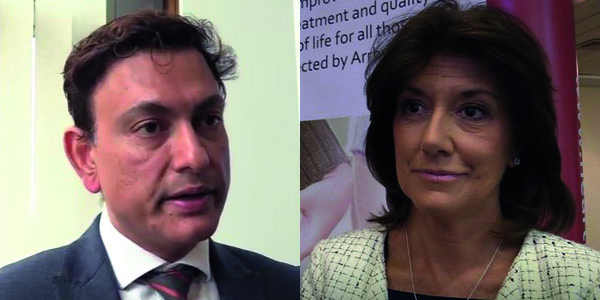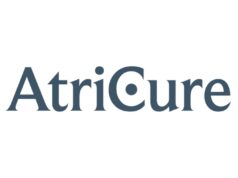
Arrhythmia Alliance, the UK-based heart rhythm charity, is calling on NHS England to reconsider a programme that it says will mean the “hundreds” of patients with atrial fibrillation in England who cannot take oral anticoagulation will be left without protection against stroke. It notes that under the commissioning through evaluation programme, after the end of November, NHS England will no longer provide funding for patients to undergo percutaneous left atrial appendage occlusion.
NHS England’s commissioning through evaluation programme is designed to enable a limited number of patients to receive a treatment that is not routinely funded by the NHS. In 2013, left atrial appendage occlusion—for the prevention of stroke in patients with atrial fibrillation—was put into this programme because NHS England required further assessment of its effectiveness before making a decision about whether or not to fund the routine use of the procedure. Over the last two years, NHS England has provided funding at 10 specialist centres across England for 450 patients with atrial fibrillation who cannot take oral anticoagulation.
The commissioning through evaluation programme is about to enter its next phase at the end of November during which the outcome data for the 450 patients will be analysed and used to inform—alongside any other significant clinical trial information for the technology that becomes available—NHS England’s final decision about funding the procedure. However, during this phase, no patients will be able to undergo left atrial appendage occlusion on the NHS after 1 December 2016.
In a press statement, Arrhythmia Alliance claims that not allowing patients to undergo the procedure will mean that patients who cannot take oral anticoagulation (“hundreds” according to its estimates) will be left unprotected against stroke. Chief executive officer and founder of the charity, Trudie Lobban, comments: “Although we believe in the concept of commissioning through evaluation, we cannot accept such high-risk patients with atrial fibrillation being unable to receive this often life-saving treatment. Arrhythmia Alliance together with many UK cardiac specialists is urging the NHS to allow those centres already in the commissioning through evaluation process to continue to provide left atrial appendage closure while the wider funding decisions are taken.”
Consultant cardiologist Dhiraj Gupta (Liverpool Heart and Chest Hospital, Liverpool, UK) has been performing left atrial appendage occlusion procedures as part of the programme. He told Cardiac Rhythm News that he and colleagues now are unclear as to how to manage patients who are being referred to them for the procedure. “Do we continue keep them under review until such a time that the NHS does fund percutaneous left atrial appendage occlusion? Or do we discharge them back to the referring physician, potentially never knowing what happens to them afterwards?” Gupta comments. He adds that these patients could be “left in limbo” for as long as 18 months, explaining that it could take 12 months for phase two of the programme to be completed and another six—presuming that NHS England does decide to fund the procedure—before the commissioning contracts are in place.
According to Gupta, NHS England deciding against funding of the procedure would be “extremely unfortunate”. “Having dealt with these complex patients for the last two years and having seen their lives transformed by this procedure—and seen their stroke risk reduced—many cardiologists feel that it would be unacceptable if we were unable to provide this treatment for these patients. It is worth bearing in mind that this treatment is available to patients in the rest of the developed world, and so patients in England could be singled out in not having access to this treatment.”
Lobban comments: “The cost of a left atrial appendage occlusion procedure as used by NHS England for commissioning through evaluation was £7,470; however, the first year cost per patient that suffers an atrial fibrillation related stroke is calculated at well over £13,000. We believe it makes sense both clinically and economically for NHS England to allow this specific subpopulation of patients to receive this potentially life-saving and life-improving technology, whilst the data evaluation is completed.”
President of the British Heart Rhythm Society, Nick Linker (The James Cook University Hospital, Middlesbrough, UK), said at a session at the Heart Rhythm Congress (9‒12 October, Birmingham, UK) where Gupta presented data on the NHS England’s commissioning through evaluation programme for left atrial appendage occlusion, that it is likely that the NHS will get an answer “sooner” than expected “because they are evaluating the data on a real-time basis and they are not necessarily going to wait for all the follow-up data to be done for six months if the trend is very clear,” he commented.
Additionally, he said that both the National Institute for Health and Care Excellence (NICE) and NHS England are “very much aware that the trial data have moved on” and the report from NICE will not only include the commissioning through evaluation programme data but also “re-evaluated” clinical trial data and information from manufacturers.
A spokesperson from NHS England told Cardiac Rhythm News that the commissioning through evaluation programme for left atrial appendage occlusion, which is supported by NICE, “provides a real opportunity to gather the vital evidence we need on the effectiveness of the procedure, for the benefit of our patients. Procedures like this obviously carry risks as well as potential benefits and it would be wrong to implement a service without proper evaluation to assess whether the benefits do outweigh the risks.”
The spokesperson additionally commented that a “new policy proposal” has recently been submitted (October 2016) to a Specialised Commissioning Clinical Panel for LAAO to consider the evidence to support routine commissioning. This is because some new evidence is now available that was not published in 2013 when the NHS England set up the commissioning through evaluation scheme for LAAO.
The spokesperson explained that in the light of this later evidence, the panel decided that the proposal should go to the next step in the process. “NHS England Specialised Commissioning has an agreed process for policy development, which includes review of the published evidence and public consultation, and Arrhythmia Alliance and other stakeholders will be invited to contribute to this process,” the spokesperson noted.
In the interview below, Gupta discusses details of the NHS England commissioning through evaluation programme for left atrial appendage occlusion, his experience at Liverpool Heart and Chest Hospital and expresses his concerns for the upcoming months. The interview took place at the Heart Rhythm Congress.









